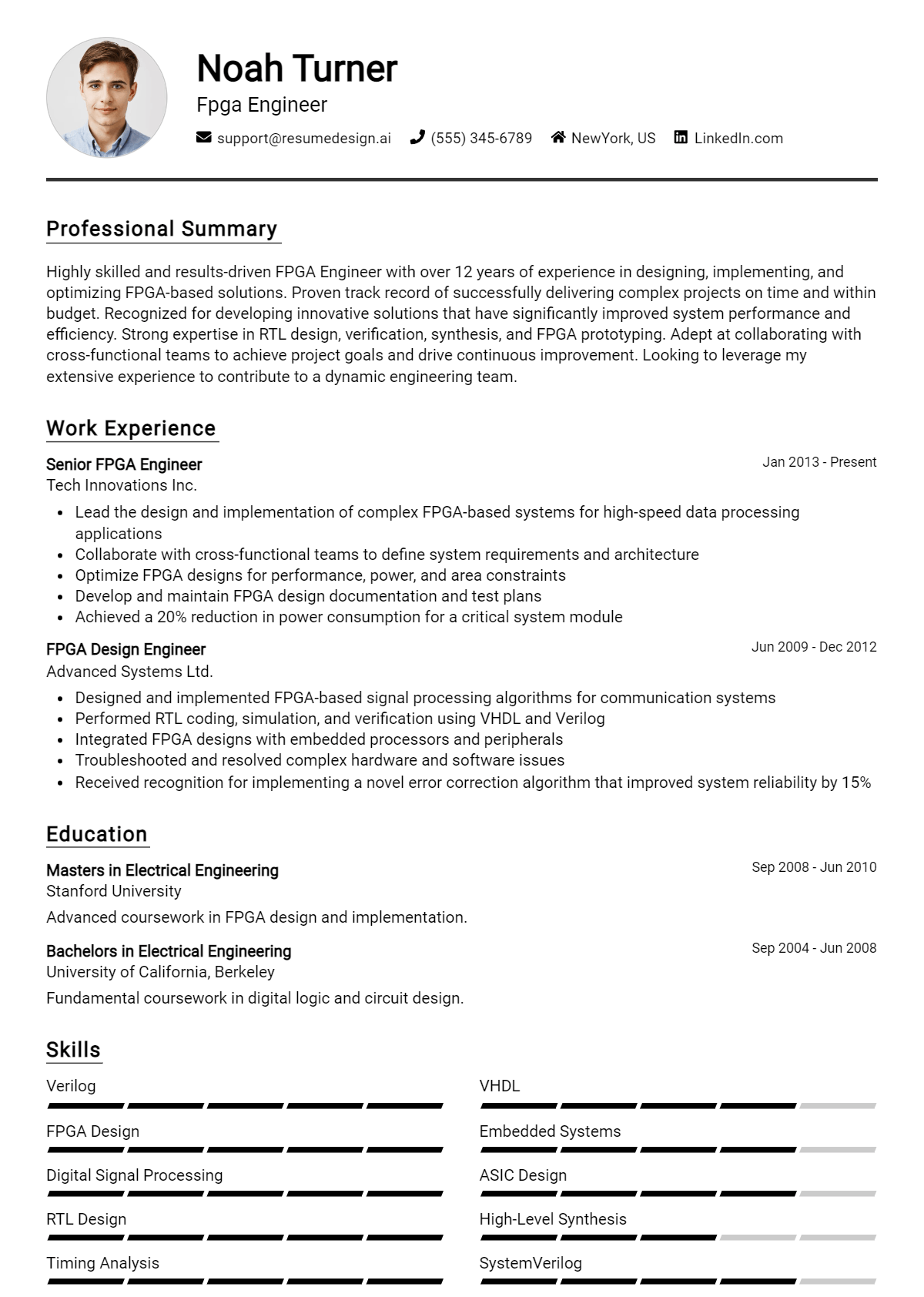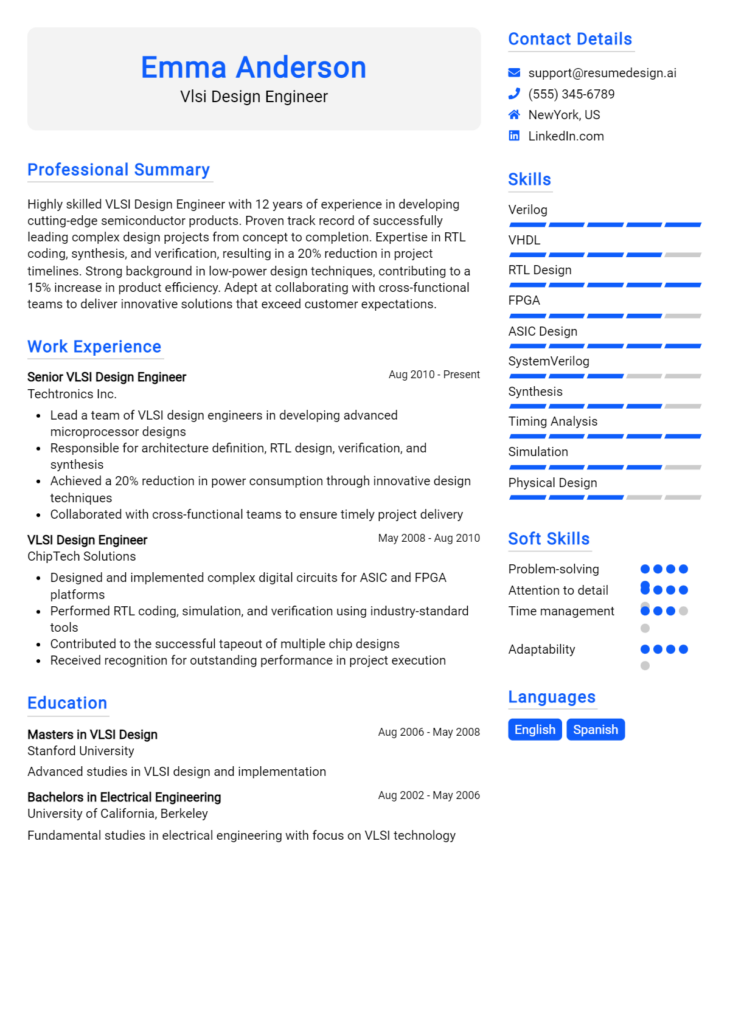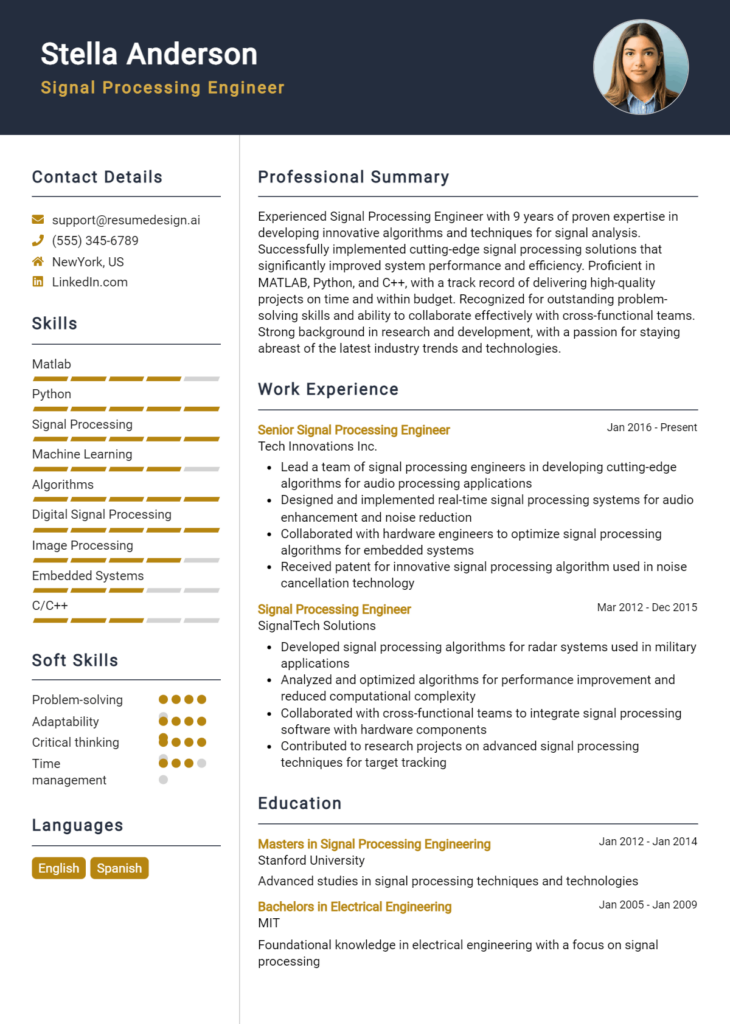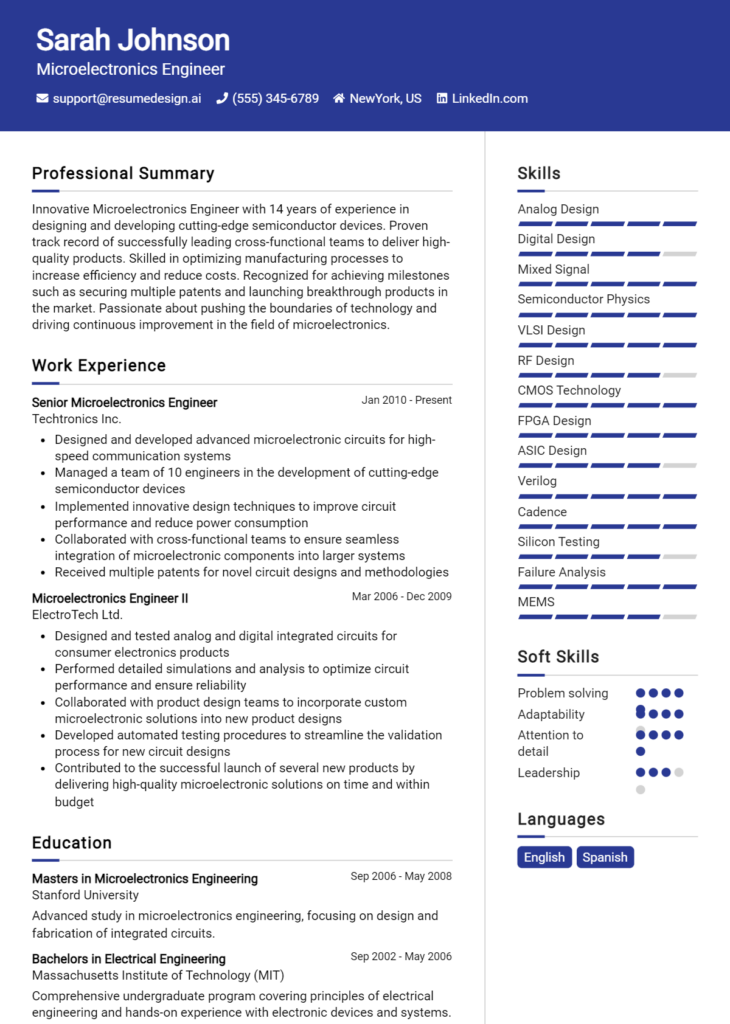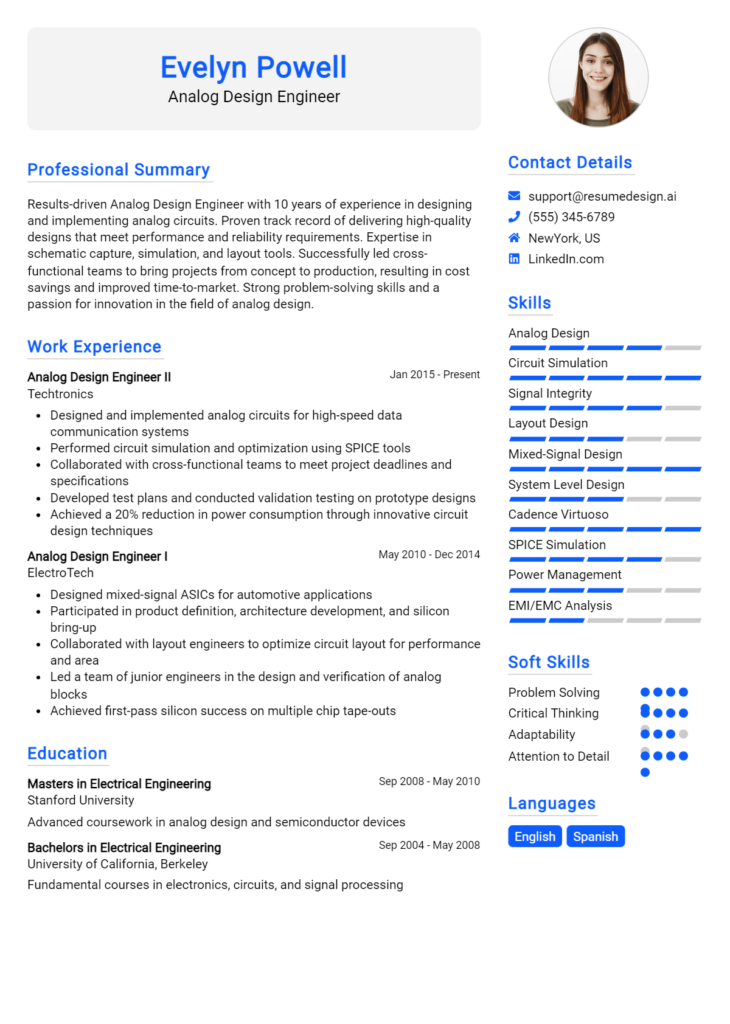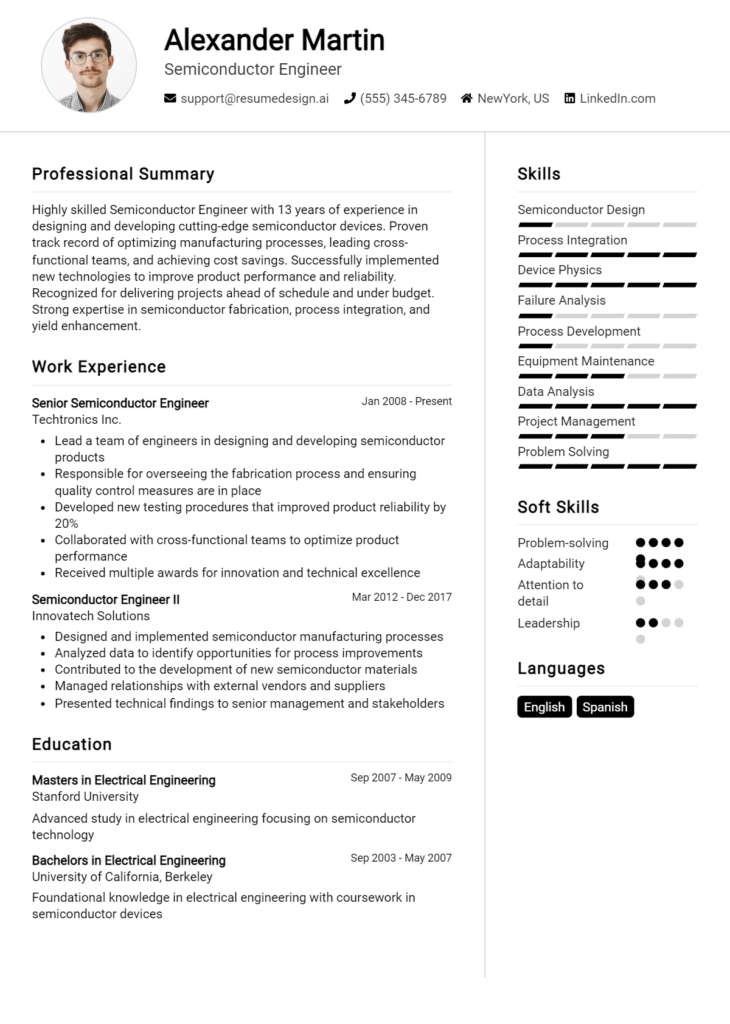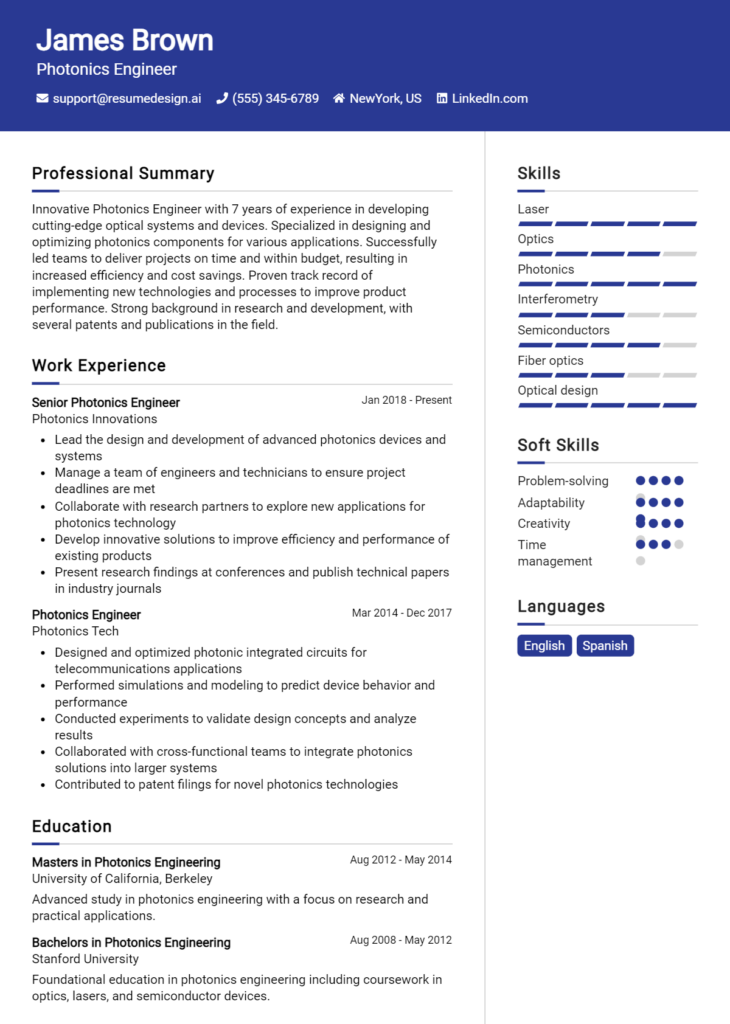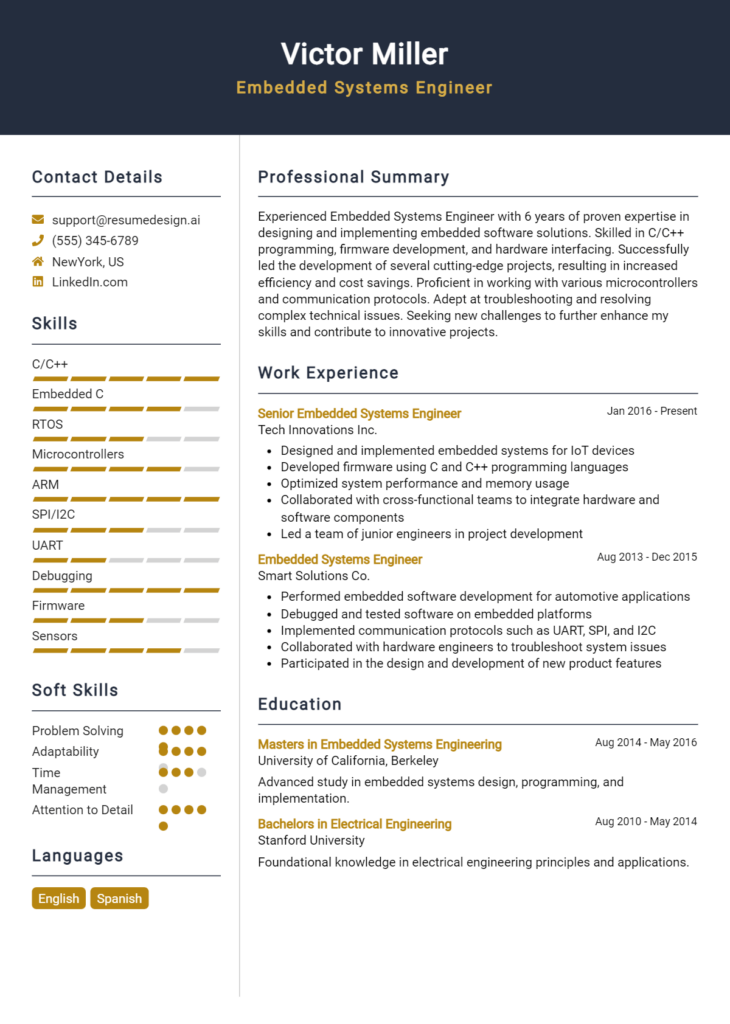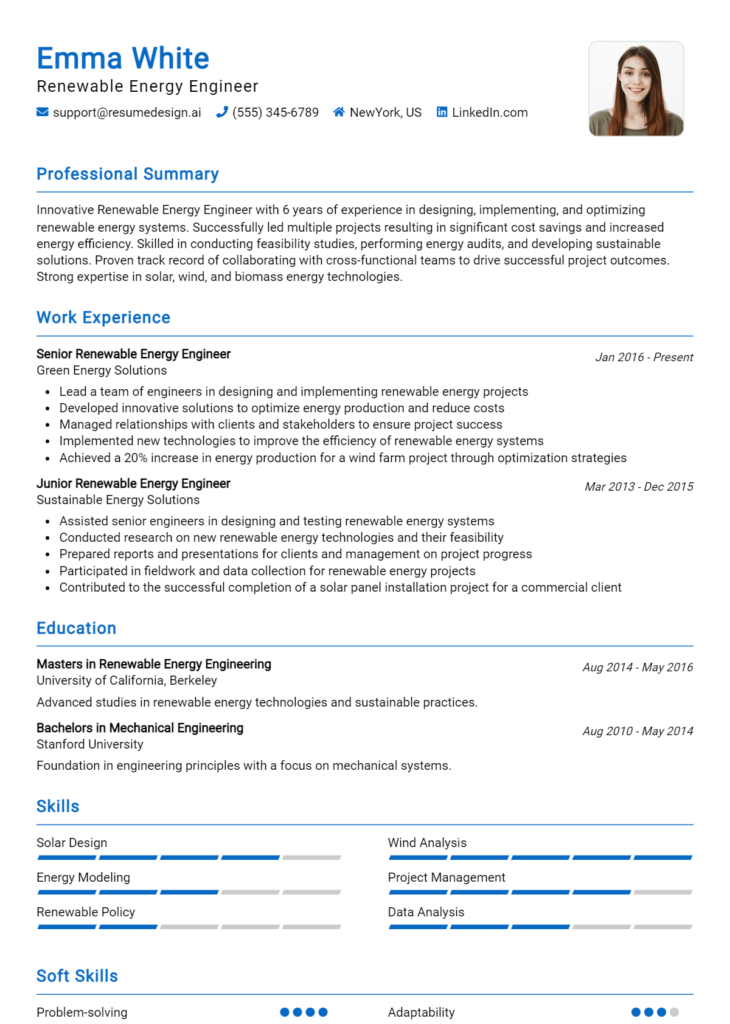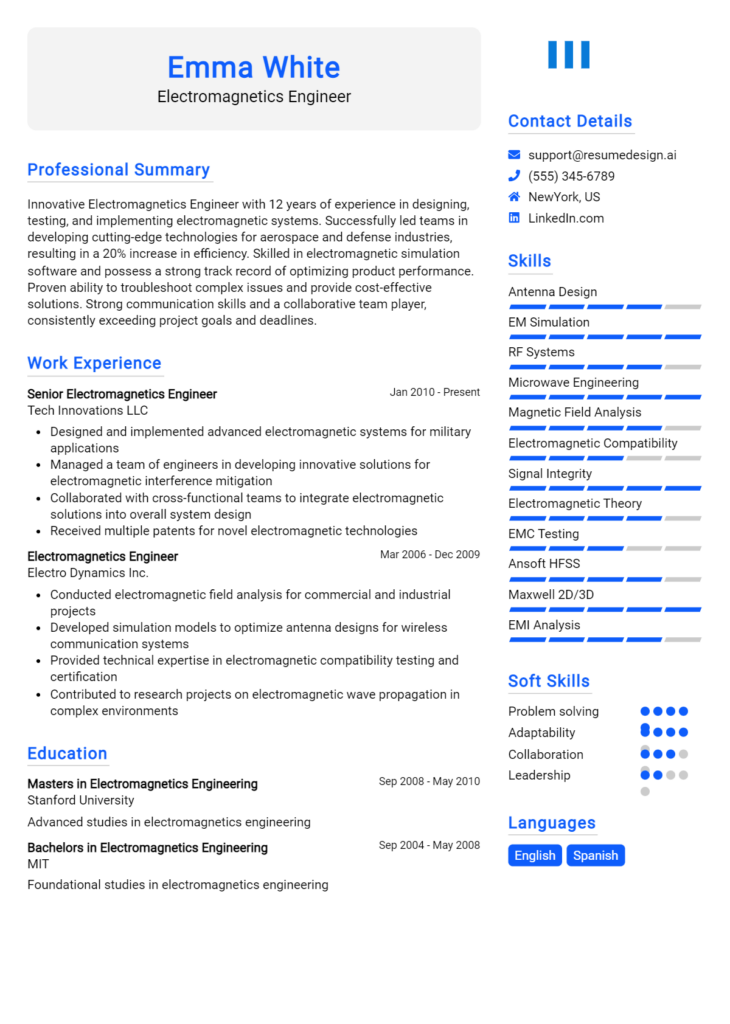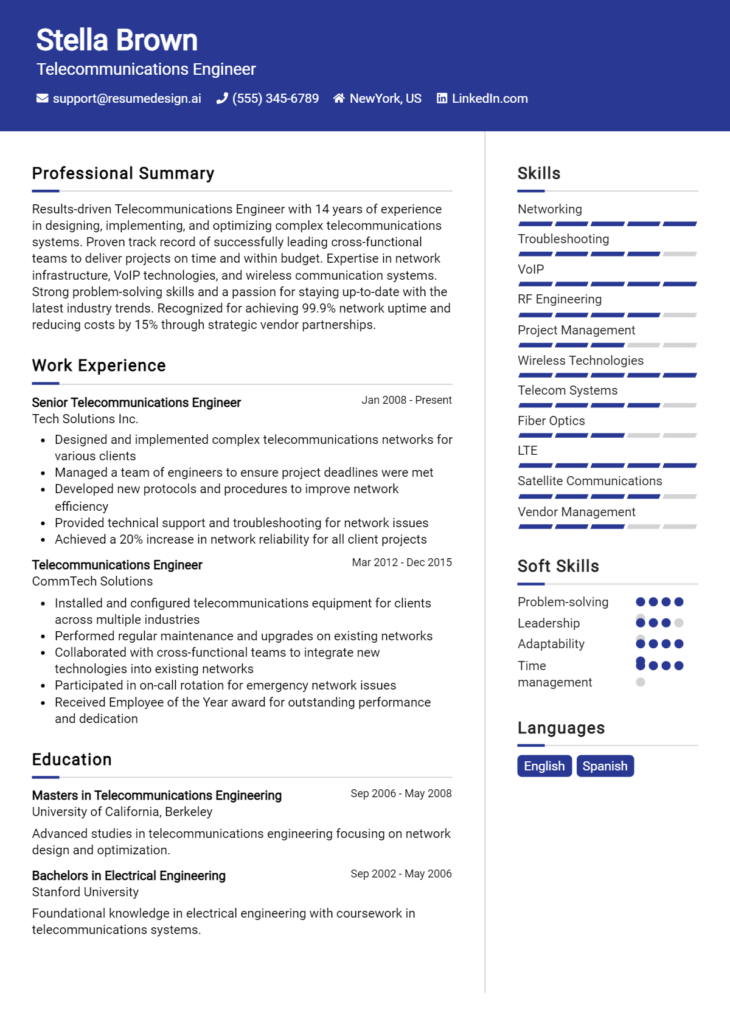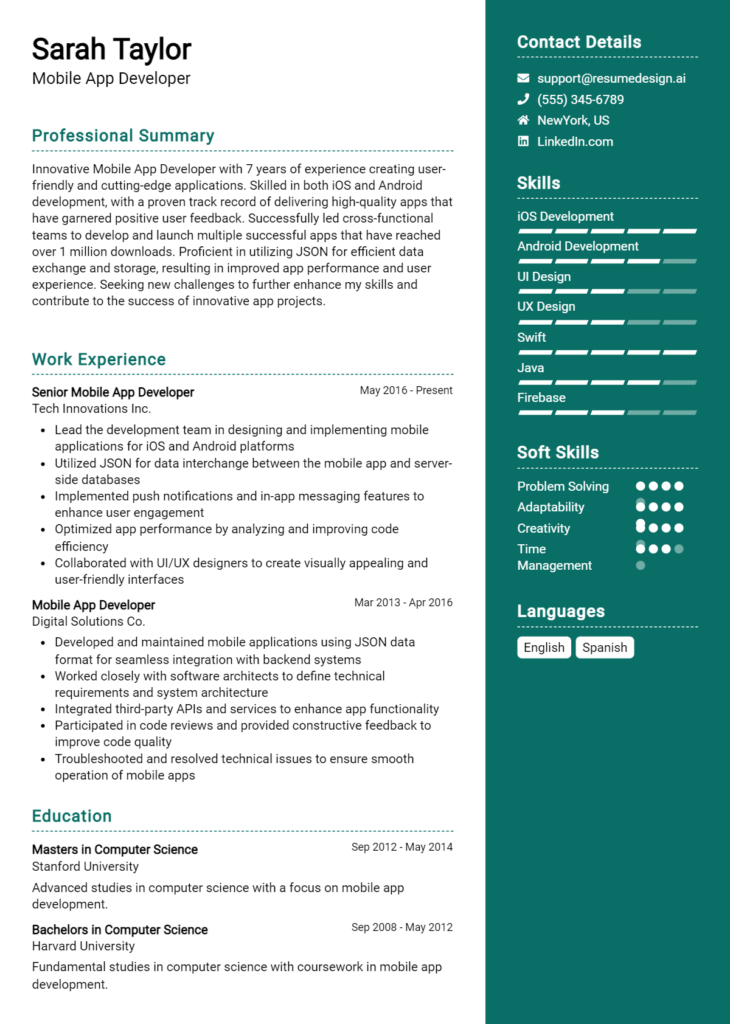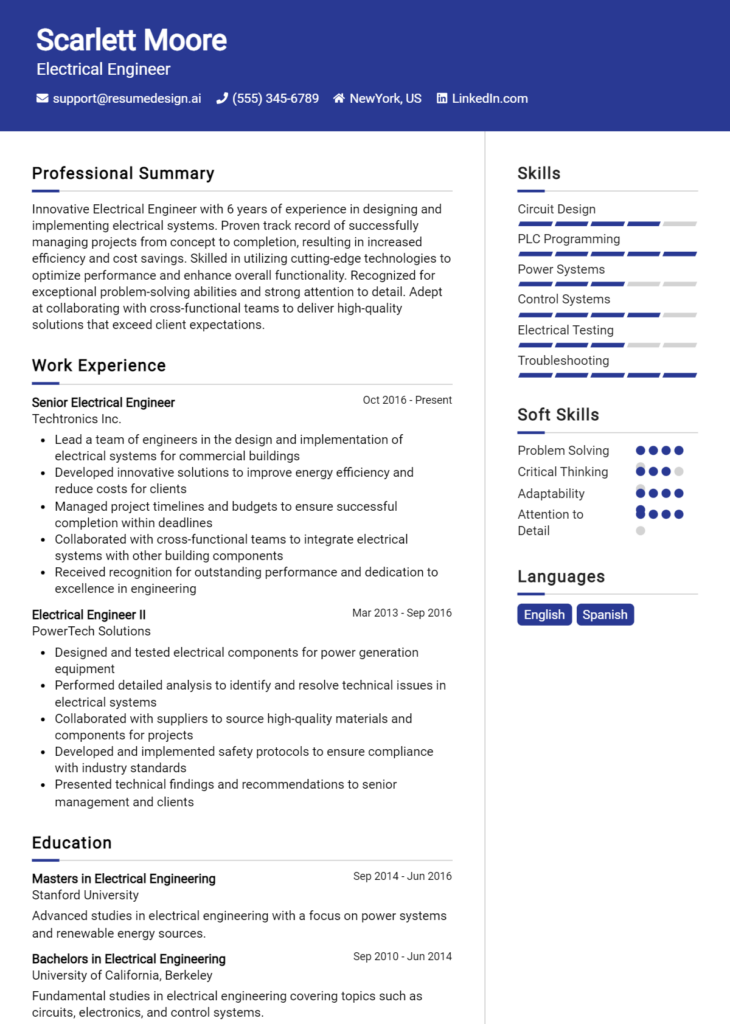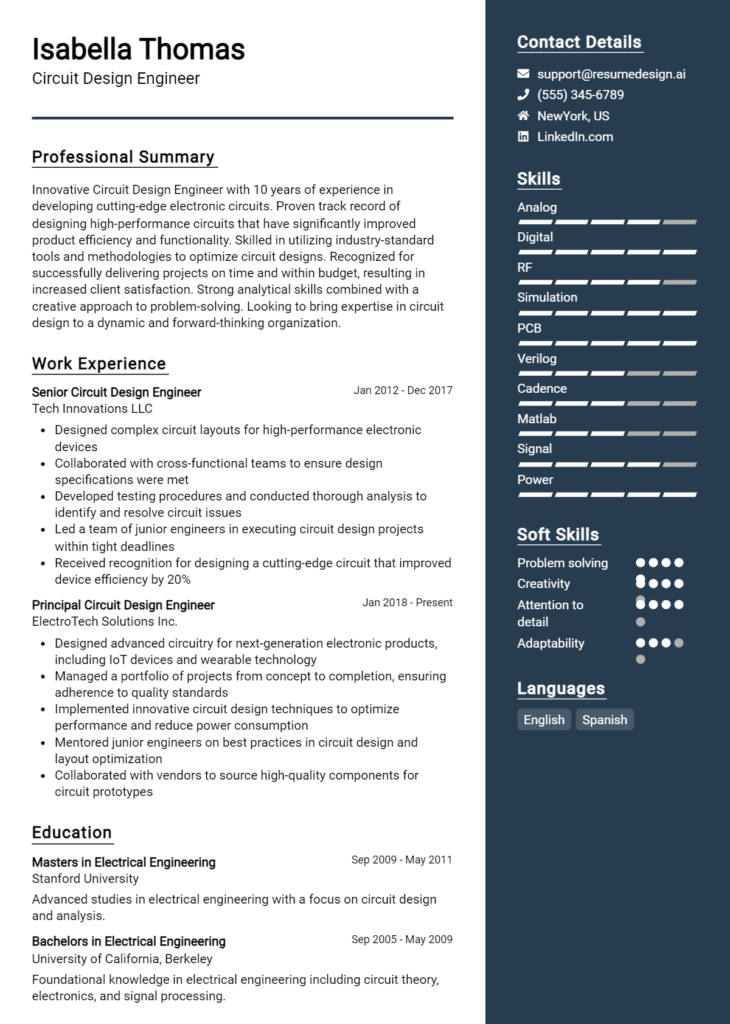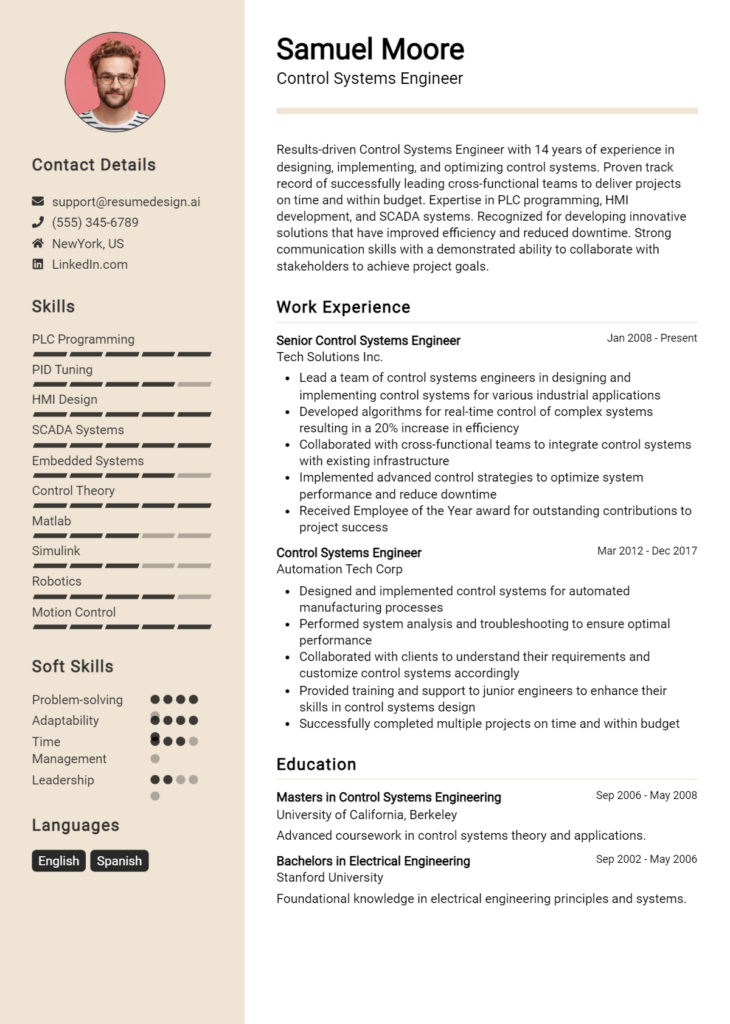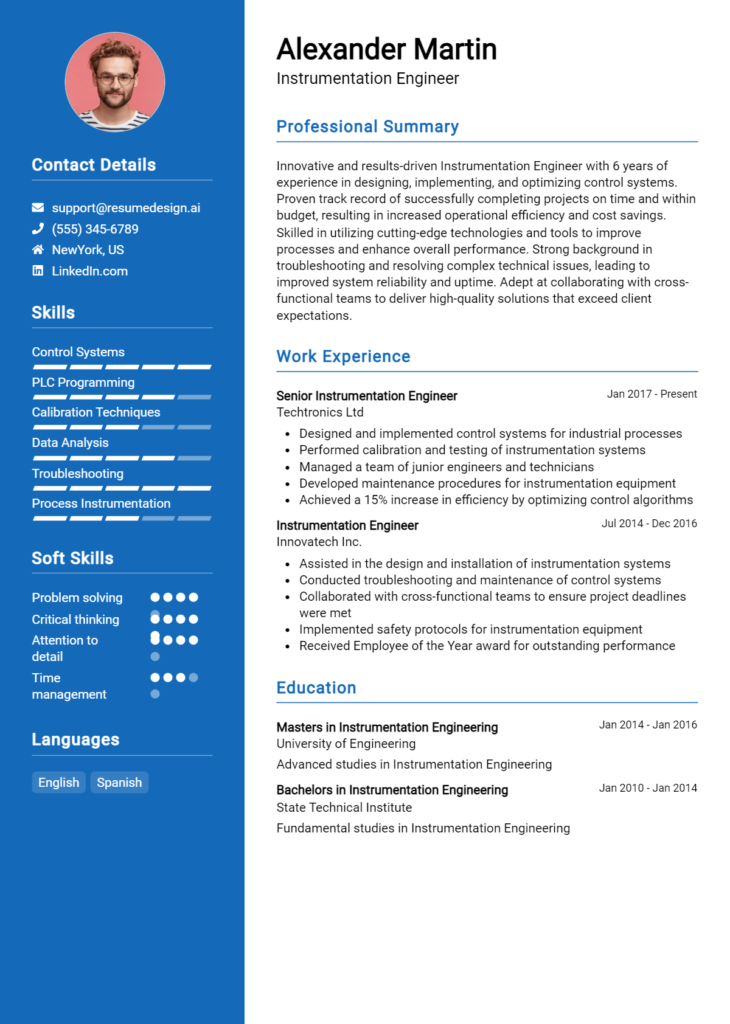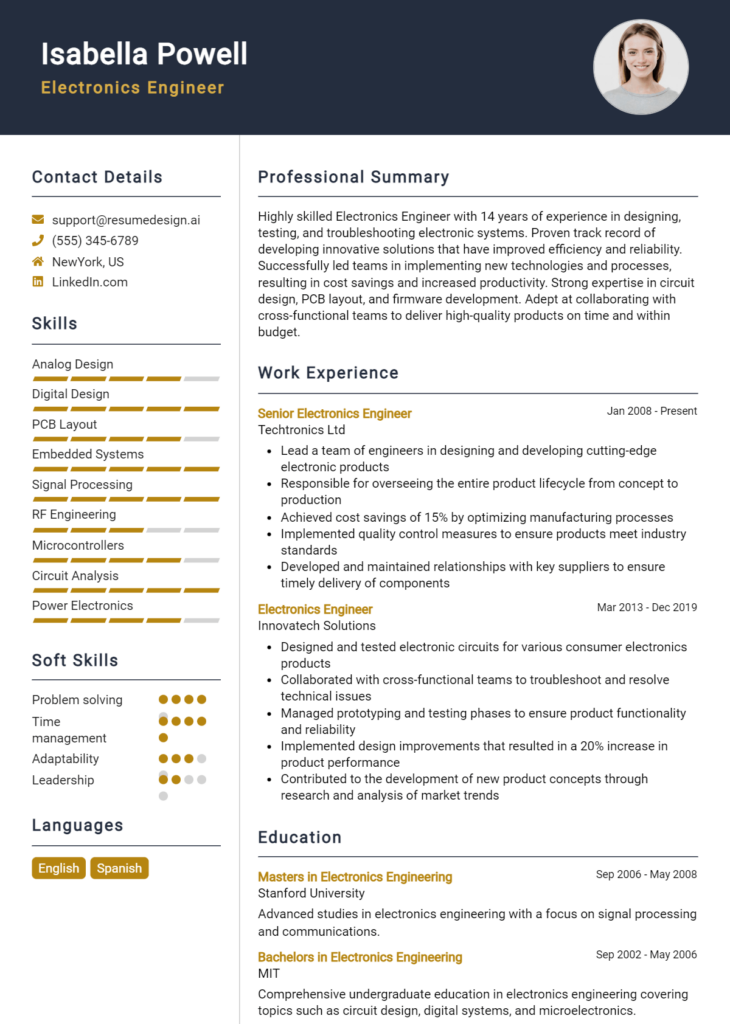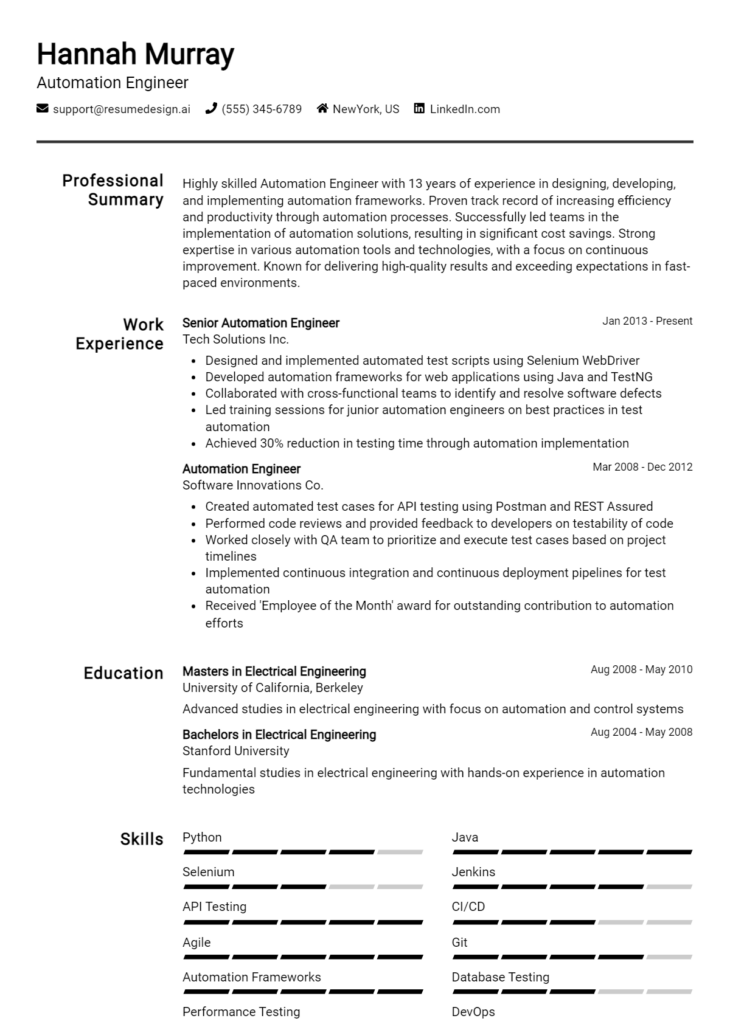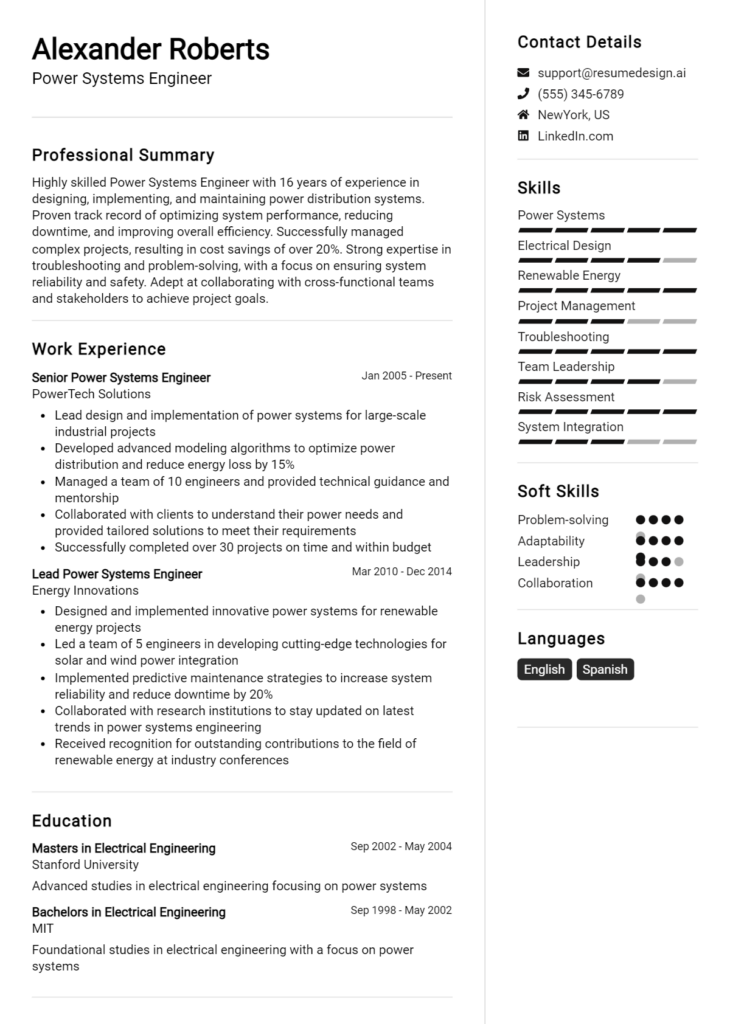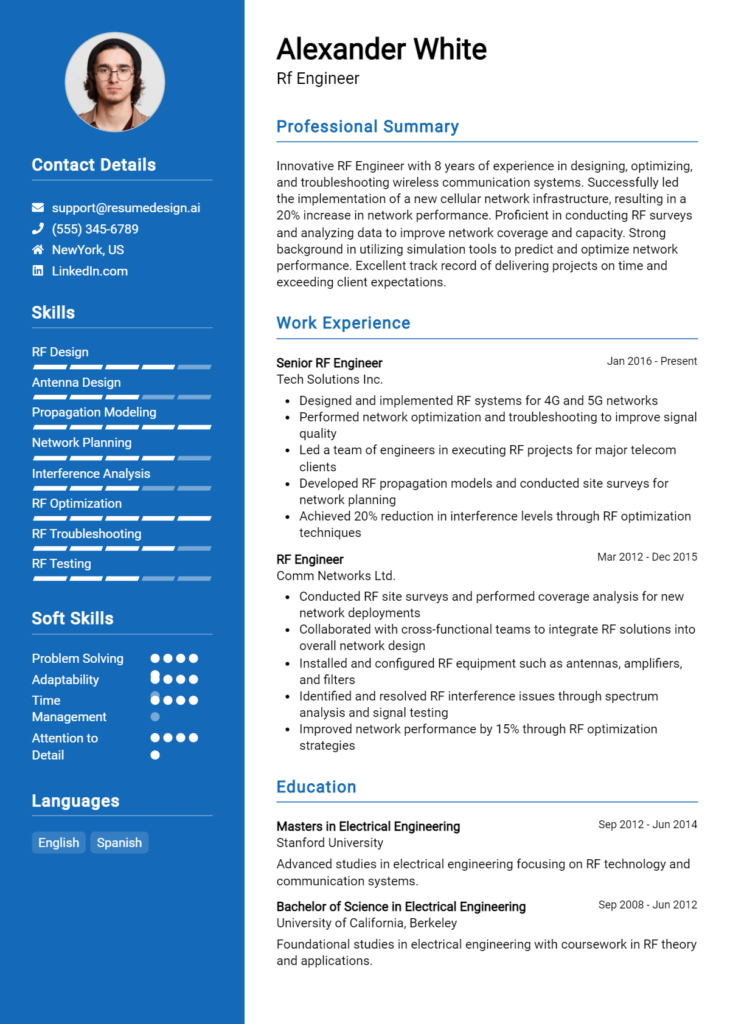FPGA Engineer Core Responsibilities
FPGA Engineers play a crucial role in the design and implementation of programmable hardware solutions, requiring a blend of technical expertise, operational efficiency, and strong problem-solving skills. They collaborate with various departments, including software, hardware, and systems engineering, to ensure seamless integration of FPGA designs into larger systems. Their ability to troubleshoot complex issues and optimize design processes is vital for achieving organizational goals. A well-structured resume highlighting these competencies can effectively showcase their qualifications and impact.
Common Responsibilities Listed on FPGA Engineer Resume
- Design and implement FPGA architecture and logic using VHDL or Verilog.
- Collaborate with cross-functional teams to define system requirements.
- Conduct simulations and testing to validate FPGA performance.
- Optimize existing designs for improved efficiency and resource utilization.
- Debug and troubleshoot hardware and software integration issues.
- Create documentation for design specifications and testing procedures.
- Stay updated on emerging technologies and industry trends.
- Participate in design reviews and provide technical insights.
- Support production and deployment of FPGA-based systems.
- Provide training and guidance to junior engineers and team members.
High-Level Resume Tips for FPGA Engineer Professionals
In the competitive field of FPGA engineering, a well-crafted resume is essential for standing out among a multitude of candidates. As the first impression a potential employer receives, your resume must effectively convey your technical expertise, relevant experience, and notable achievements. It's not just a list of jobs; it's a marketing tool that showcases your unique qualifications in a way that resonates with hiring managers. This guide will provide practical and actionable resume tips specifically tailored for FPGA Engineer professionals, helping you to present yourself as the ideal candidate for your next opportunity.
Top Resume Tips for FPGA Engineer Professionals
- Tailor your resume to the job description; use keywords from the posting to align your skills with the employer's needs.
- Highlight your relevant experience in FPGA design, development, and testing to demonstrate your hands-on expertise.
- Quantify your achievements by including metrics that showcase your contributions, such as performance improvements or project successes.
- Showcase industry-specific skills such as VHDL, Verilog, or SystemVerilog, and emphasize your familiarity with relevant tools like Xilinx or Altera software.
- Include a section dedicated to certifications or continuing education courses relevant to FPGA engineering, underscoring your commitment to professional growth.
- Utilize a clean, organized format that allows for easy reading; ensure your most important information stands out.
- Incorporate projects or case studies that illustrate your problem-solving capabilities and innovative thinking in FPGA design.
- Use action verbs to describe your responsibilities and accomplishments, bringing vitality to your experiences.
- Keep your resume concise, ideally one page, while ensuring all critical information is effectively communicated.
By implementing these tips, you can significantly enhance your resume's effectiveness, increasing your chances of landing a desirable position in the FPGA Engineer field. A polished and targeted resume not only reflects your technical capabilities but also conveys your professionalism and attention to detail, making you a more attractive candidate to potential employers.
Why Resume Headlines & Titles are Important for FPGA Engineer
In the competitive field of FPGA engineering, having a well-crafted resume headline or title is essential for making a strong first impression on hiring managers. A compelling headline can immediately grab attention, providing a succinct summary of a candidate's key qualifications and relevant experience. It serves as the first point of contact between the applicant and the employer, making it crucial to convey value in just a few words. A strong headline should be concise, relevant, and directly aligned with the job being applied for, setting the stage for the rest of the resume and enhancing the chances of securing an interview.
Best Practices for Crafting Resume Headlines for FPGA Engineer
- Keep it concise: Aim for one impactful phrase that captures your essence.
- Be specific: Use terminology relevant to the FPGA engineering field.
- Highlight key skills: Focus on your most valuable technical skills or experiences.
- Use action-oriented language: Choose dynamic verbs that convey a sense of achievement.
- Align with job description: Tailor your headline to match the specific role you’re applying for.
- Showcase accomplishments: If applicable, mention quantifiable achievements that set you apart.
- Avoid jargon: Keep the language clear and accessible to ensure understanding.
- Stay professional: Maintain a formal tone suitable for the engineering field.
Example Resume Headlines for FPGA Engineer
Strong Resume Headlines
Innovative FPGA Engineer with 5+ Years in High-Speed Digital Design
Results-Driven FPGA Developer Specializing in Signal Processing Solutions
Experienced FPGA Engineer with Proven Track Record in Embedded Systems Development
Certified FPGA Specialist with Expertise in VHDL and Verilog Programming
Weak Resume Headlines
Engineer Looking for Job
FPGA Engineer with Some Experience
The strong headlines are effective because they clearly communicate the candidate's expertise and core competencies in FPGA engineering, making them immediately relevant to potential employers. They utilize specific language and highlight unique skills and experiences that position the candidate as a strong contender for the role. In contrast, the weak headlines fail to impress due to their vagueness and lack of specificity, which do not provide any real insight into the candidate's qualifications or what they bring to the table. This highlights the importance of crafting a focused and impactful resume headline to stand out in a competitive job market.
Writing an Exceptional FPGA Engineer Resume Summary
A well-crafted resume summary is crucial for an FPGA Engineer as it serves as a powerful introduction that captures the attention of hiring managers. This brief paragraph highlights your key skills, relevant experience, and significant accomplishments in the field of FPGA design and engineering. A strong summary quickly conveys your value proposition, making it easier for recruiters to see how you align with the specific needs of the role. It should be concise, impactful, and tailored to the job description, ensuring that you stand out in a competitive job market.
Best Practices for Writing a FPGA Engineer Resume Summary
- Quantify Achievements: Use numbers and metrics to demonstrate your impact, such as performance improvements or project completion times.
- Focus on Skills: Highlight specific technical skills relevant to FPGA engineering, such as VHDL, Verilog, or hardware design.
- Tailor the Summary: Customize your summary for each job application, aligning your experience with the job description.
- Be Concise: Keep your summary to 3-5 sentences, ensuring it is easy to read and straight to the point.
- Highlight Relevant Experience: Mention specific projects or roles that showcase your experience in FPGA development.
- Use Action Words: Start sentences with strong action verbs to convey confidence and proactivity.
- Include Certifications: If applicable, mention any relevant certifications or training that enhance your qualifications.
- Reflect Passion for the Field: Convey your enthusiasm for technology and innovation in FPGA engineering.
Example FPGA Engineer Resume Summaries
Strong Resume Summaries
Dedicated FPGA Engineer with over 5 years of experience in designing high-performance digital circuits. Successfully reduced latency by 30% on a key project through optimized VHDL coding. Proven track record in collaborating with cross-functional teams to deliver projects on-time and within budget.
Results-driven FPGA Engineer specializing in the development of embedded systems. Led a team that implemented a new design methodology, resulting in a 25% increase in design efficiency. Skilled in Verilog and SystemVerilog with a strong background in simulation and verification.
Innovative FPGA Engineer with expertise in reconfigurable computing and digital signal processing. Achieved a 40% reduction in resource utilization for a major client by implementing advanced design techniques. Holds a Master’s degree in Electrical Engineering and several industry certifications.
Weak Resume Summaries
Experienced engineer with knowledge in FPGA technology looking for a new opportunity.
Motivated individual seeking to apply skills in FPGA engineering to a new role. Familiar with various tools and processes.
The strong resume summaries stand out due to their specificity, quantifiable achievements, and relevant skills closely aligned with the FPGA engineering role. They provide concrete examples of the candidates' capabilities and contributions, making a compelling case for their hiring. In contrast, the weak summaries lack detail and measurable outcomes, presenting a generic view of the candidate's experience that fails to capture the attention of hiring managers.
Work Experience Section for FPGA Engineer Resume
The work experience section of an FPGA Engineer resume is vital as it provides a comprehensive overview of the candidate's technical skills, project management abilities, and their effectiveness in delivering high-quality products. This section serves as a platform for candidates to demonstrate their proficiency in FPGA design, implementation, and testing, as well as their capability to lead teams and collaborate effectively. By quantifying achievements and aligning experiences with industry standards, candidates can differentiate themselves in a competitive job market, showcasing their value to potential employers.
Best Practices for FPGA Engineer Work Experience
- Highlight relevant technical skills, such as VHDL/Verilog proficiency and experience with simulation tools.
- Quantify achievements by including metrics like performance improvements, cost reductions, or project completion times.
- Detail specific projects, focusing on your role and contributions to successful outcomes.
- Emphasize collaboration efforts, including cross-functional teamwork and mentorship roles.
- Use action verbs to describe your responsibilities and accomplishments for greater impact.
- Align your experiences with industry standards and emerging technologies to demonstrate current knowledge.
- Include any certifications or specialized training relevant to FPGA engineering.
- Tailor your work experience to match the job description of the position you're applying for.
Example Work Experiences for FPGA Engineer
Strong Experiences
- Led a team of 5 engineers in the development of a high-speed data processing FPGA, resulting in a 30% increase in throughput and a 15% reduction in power consumption.
- Designed and implemented a custom FPGA solution for a telecommunications application, achieving a 25% reduction in latency and earning recognition from the client for outstanding performance.
- Collaborated with software engineers to integrate FPGA-based systems, improving overall system performance by 40% and decreasing time-to-market by 3 months.
Weak Experiences
- Worked on FPGA projects with limited details about contributions or outcomes.
- Assisted in team efforts without specifying any particular achievements or responsibilities.
- Involved in general FPGA design tasks without highlighting any quantifiable results.
The examples of strong experiences are considered effective because they provide clear, quantifiable outcomes and demonstrate leadership and collaboration, showcasing the candidate's impact on projects. In contrast, the weak experiences lack specificity, measurable results, and do not illustrate the candidate's contributions in a meaningful way, making them less compelling to potential employers.
Education and Certifications Section for FPGA Engineer Resume
The education and certifications section of an FPGA Engineer resume plays a crucial role in establishing the candidate's qualifications and expertise in the field. This section is essential because it highlights the candidate's academic background, industry-relevant certifications, and ongoing commitment to professional development. By including pertinent coursework, specialized training, and recognized certifications, candidates can significantly enhance their credibility and demonstrate alignment with the job requirements, making a compelling case for their capabilities as an FPGA Engineer.
Best Practices for FPGA Engineer Education and Certifications
- Include degrees in relevant fields such as Electrical Engineering or Computer Engineering.
- List industry-recognized certifications like Xilinx Certified FPGA Developer or Intel FPGA Certification.
- Incorporate relevant coursework that demonstrates knowledge of digital design, VHDL/Verilog, and embedded systems.
- Be specific about the level of certification achieved, such as Advanced or Professional levels.
- Highlight any specialized training in FPGA design tools and methodologies.
- Keep the information concise and focused on credentials that add value to the FPGA role.
- Update this section regularly to reflect new certifications or educational achievements.
- Consider including awards or honors that showcase excellence in engineering or related fields.
Example Education and Certifications for FPGA Engineer
Strong Examples
- B.S. in Electrical Engineering, University of Technology, 2021
- Xilinx Certified FPGA Developer, 2023
- Relevant Coursework: Digital Logic Design, FPGA Architecture, and Embedded Systems.
- Advanced VHDL Training, 2022
Weak Examples
- B.A. in History, University of Arts, 2018
- Certification in Basic Computer Skills, 2020
- Coursework in Graphic Design and Multimedia, 2019
- Old FPGA Certification from 2015 with outdated tools.
The examples provided illustrate the importance of relevance in educational qualifications and certifications. The strong examples are directly aligned with the skills and knowledge required for an FPGA Engineer, showcasing pertinent degrees and specialized certifications that enhance the candidate's profile. In contrast, the weak examples highlight irrelevant educational backgrounds and outdated certifications that do not contribute to the candidate's qualifications for the role, ultimately detracting from their appeal to potential employers.
Top Skills & Keywords for FPGA Engineer Resume
As an FPGA Engineer, showcasing the right skills on your resume is crucial for standing out in a competitive job market. Employers look for candidates who not only possess technical expertise but also demonstrate strong interpersonal abilities. Highlighting a blend of hard and soft skills can effectively communicate your qualifications and adaptability to potential employers. Understanding the specific skills required for the role can significantly enhance your resume and increase your chances of landing that desirable position.
Top Hard & Soft Skills for FPGA Engineer
Soft Skills
- Problem-solving
- Attention to detail
- Communication skills
- Team collaboration
- Time management
- Adaptability
- Critical thinking
- Creativity
- Analytical skills
- Project management
Hard Skills
- VHDL/Verilog programming
- FPGA design and development
- Digital circuit design
- Simulation and verification tools (e.g., ModelSim)
- Synthesis tools (e.g., Xilinx Vivado, Intel Quartus)
- Hardware description languages
- Signal processing techniques
- PCB design and layout
- Embedded systems knowledge
- Debugging and troubleshooting techniques
By emphasizing both skills and work experience relevant to the FPGA Engineer role, you can create a compelling resume that captures the attention of recruiters and demonstrates your readiness for the challenges of the position.
Stand Out with a Winning FPGA Engineer Cover Letter
Dear Hiring Manager,
I am writing to express my interest in the FPGA Engineer position at [Company Name], as advertised on [where you found the job listing]. With a strong background in digital design and a passion for developing high-performance FPGA solutions, I am confident in my ability to contribute effectively to your team. My experience includes successful projects in both the telecommunications and automotive sectors, where I have designed and implemented FPGA architectures that not only met but exceeded project requirements.
In my previous role at [Previous Company Name], I led a team in the development of a complex signal processing system on an FPGA platform, utilizing VHDL and Verilog for design and simulation. This project highlighted my ability to work collaboratively while ensuring rigorous adherence to deadlines and quality standards. Additionally, my proficiency in tools like Xilinx Vivado and Altera Quartus has enabled me to optimize designs for efficiency and performance, resulting in a 20% improvement in processing speed for our last project.
I am particularly drawn to the innovative work being done at [Company Name] and am excited about the opportunity to contribute my skills in FPGA design and development. I am eager to bring my expertise in algorithm implementation and system integration to your team to help drive the development of cutting-edge solutions. I believe my technical skills, coupled with my commitment to continuous learning and improvement, will allow me to be a valuable asset to your organization.
Thank you for considering my application. I look forward to the opportunity to discuss how my background, skills, and enthusiasms align with the needs of your team. I am excited about the possibility of contributing to the groundbreaking projects at [Company Name] and am eager to bring my passion for FPGA engineering to your esteemed company.
Sincerely,
[Your Name]
[Your Phone Number]
[Your Email Address]
Common Mistakes to Avoid in a FPGA Engineer Resume
When crafting a resume as an FPGA Engineer, it’s crucial to present your skills and experiences effectively to stand out in a competitive job market. Unfortunately, many candidates make common mistakes that can undermine their chances of landing an interview. Avoiding these pitfalls can significantly enhance your resume's professionalism and clarity, making it easier for potential employers to recognize your qualifications. Here are some common mistakes to watch out for:
Lack of Specificity: Failing to provide specific details about your projects can leave employers in the dark about your actual contributions and skills. Instead of saying "worked on FPGA designs," specify "designed and implemented a 16-bit RISC processor on an FPGA."
Using Generic Language: Using clichéd phrases like "team player" or "hard worker" without backing them up with examples can weaken your resume. Focus on quantifiable achievements and concrete results to demonstrate these qualities.
Neglecting Technical Skills: Omitting relevant technical skills, such as VHDL, Verilog, or specific FPGA tools (e.g., Xilinx ISE, Quartus), can make your resume less compelling. Clearly list your technical proficiencies to show you meet the job's requirements.
Overloading with Jargon: While technical terms are essential, overloading your resume with jargon can confuse hiring managers who may not have an in-depth understanding of FPGA technology. Strive for a balance between technical language and clear communication.
Not Tailoring the Resume: Sending a generic resume to multiple employers can lead to missed opportunities. Customize your resume for each position by aligning your experiences with the specific job description and company culture.
Ignoring Soft Skills: While technical skills are critical, soft skills such as problem-solving, communication, and teamwork are equally important. Make sure to highlight instances where you utilized these skills effectively in your projects.
Formatting Issues: A cluttered or poorly organized resume can distract from your qualifications. Use a clean format, consistent fonts, and bullet points to improve readability and ensure key information stands out.
Failing to Include Relevant Certifications: If you have certifications related to FPGA design or other relevant fields, be sure to include them. Certifications can enhance your credibility and show your commitment to professional development.
Conclusion
As an FPGA Engineer, your expertise in designing, implementing, and testing field-programmable gate arrays is critical in various industries, including telecommunications, automotive, and consumer electronics. Key skills often sought in this role include proficiency in hardware description languages (HDLs) like VHDL or Verilog, experience with simulation and synthesis tools, and a strong understanding of digital design principles. Additionally, knowledge of embedded systems and debugging techniques can give you a competitive edge.
To stand out in this competitive field, it's essential to present your qualifications effectively in your resume. Highlight specific projects that demonstrate your technical skills, problem-solving abilities, and contributions to team efforts. Quantifying your achievements with metrics can further enhance the impact of your resume.
In conclusion, if you're looking to make a strong impression as an FPGA Engineer, take a moment to review and refine your resume. Utilize available resources such as resume templates, resume builder, resume examples, and cover letter templates to ensure your application stands out to potential employers. Start today and take the next step in advancing your career!

